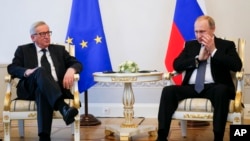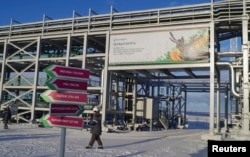There is growing angst over how Britain’s decision to leave the European Union will impact Russia’s strategic footing around the globe, but disagreement about how much it will affect Moscow, just as the West moves to curb Russian aggression in the Baltics and Syria.
President Barack Obama tried to allay fears Tuesday, cautioning against post-Brexit “hysteria” and the notion that the European Union is unraveling and member states are drifting away from the United States on key global issues.
“Europe can’t afford to turn inward,” Obama told NPR journalist Steve Inskeep during an interview broadcast Tuesday.
“They’re going to have to worry about working with us on the Middle East. They are going to have to worry about us working together to deal with an aggressive Russia,” said the U.S. leader.
No big shifts seen
The president added he does not expect “cataclysmic changes,” and he pointed to the importance of the NATO alliance and shared U.S.-European interests.
But analysts said Brexit has played squarely into Russian President Vladimir Putin’s larger strategic designs for Europe, following Moscow’s annexation of Crimea in 2014 and its continued support for pro-Russian separatists in eastern Ukraine.
“Under Putin, Russia has strategically sought to destabilize European politics, undermine Democratic values and weaken the EU’s resolve, particularly on a cohesive Russia policy. Here I’m referring to sanctions,” said Alina Polyakova, deputy director of the Dinu Patriciu Eurasia Center at the Atlantic Council, a global affairs research group.
In June, the 28-member bloc voted to extend by six months current economic sanctions against Russia for failing to follow through on the Minsk agreements meant to end the conflict in Ukraine. The sanctions target the oil, financial and defense sectors of the Russian economy.
Softer stances
The U.S. and Britain have remained together on sanctions against the Kremlin, but other EU states have softened their positions.
German Foreign Minister Frank-Walter Steinmeier and Italian Prime Minister Matteo Renzi have backed sanctions relief. In April, the French parliament approved a nonbinding resolution to lift the EU sanctions against Russia.
“Our view is we don't expect the U.K.’s referendum to have any impact on the rollover of sanctions against Russia,” said Eric Schultz, White House deputy press secretary.
“Obviously having the Britain vote to leave weakens the European Union,” said Angela Stent with the Center for Eurasian, Russian and Eastern European Studies at Georgetown University. Still, she cautioned, Brexit “has unknown consequences. It’s not immediately clear how Russia benefits from this.”
However, Stent added, Putin would like to see a weakened EU.
“What the Kremlin wants is a new global order, not one imposed by the U.S. and its European allies,” she said.
Polyakova agreed, saying Russia prefers bilateral negotiations.
“It does not prefer to negotiate with a bloc, like the EU,” said Polyakova, adding Moscow “could play member states against each other and get what it wants at the bilateral level that it won’t be able to get at the EU level.”
Russian interest
Putin has denied Western claims that he has strategically worked to destabilize Europe in various ways, including backing far-right groups such as the National Front in France.
But experts say Russia has an interest in making sure the European Union remains economically stable.
“It is in their interest to have a Europe that will continue to grow and prosper and buy more oil and gas from Russia,” said Polyakova.
“I don’t think that we are going to see one great domino effect going forward after the Brexit vote,” predicted Polyakova. “Even though Russia likes to stir the pot in these countries, it is certain that these kinds of populist, anti-EU movements are domestically driven.”
Putin has praised Brexit, saying the vote demonstrated that “people want to be more independent” and do not want “to feed and to subsidize weaker economies.”
Obama said the vote simply pressed “a pause button” on European integration as nations look for ways to maintain their identities and deal with voter frustrations.
“But the basic core values of Europe, the tenets of liberal market-based democracies, those aren’t changing,” Obama added.






